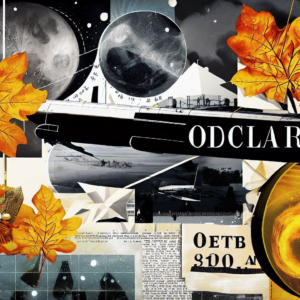The tapestry of history is woven with events of significance, some altering the course of entire civilizations and others impacting individual lives in profound ways. The 20th of October is no exception, with its chronicle brimming with defining moments. Let’s delve deep into some of the key events that have taken place on this day.
Today in History: 20 October

1. The Saturday Night Massacre (1973)
One of the most dramatic episodes during the Watergate scandal was the so-called “Saturday Night Massacre.” On this day in 1973, in a series of contentious events, U.S. President Richard Nixon ordered Attorney General Elliot Richardson to fire special prosecutor Archibald Cox. Richardson refused and resigned. Nixon then ordered Deputy Attorney General William Ruckelshaus to do the same; he too refused and resigned. The task eventually fell to Solicitor General Robert Bork, who complied with Nixon’s order. This entire episode greatly damaged Nixon’s standing and set the stage for his eventual resignation.
2. Birth of Arthur Rimbaud (1854)
On 20 October 1854, one of France’s most celebrated poets, Jean Nicolas Arthur Rimbaud, was born. Known for his libertine lifestyle and for influencing modernist and surrealist poets, Rimbaud wrote most of his best-known works before the age of 20. His premature end to his writing career and subsequent adventures, including gun-running in Africa, only added to his mystique.
3. Opening of the Sydney Opera House (1973)
One of the 20th century’s most iconic buildings, the Sydney Opera House, was formally opened by Queen Elizabeth II on this day. The multi-venue performing arts center, located in Sydney, New South Wales, Australia, has since become one of the most recognized and photographed buildings globally. Its unique shell-like design, credited to architect Jørn Utzon, is a masterpiece of modern architecture.
4. The U.S. Invades Puerto Cabello (1962)
During the Cuban Missile Crisis, the U.S. launched Operation Blue Moon, invading the Venezuelan port of Puerto Cabello after suspecting it to house Cuban military supplies possibly intended for guerrillas in Venezuela. Though the invasion didn’t yield significant findings, it reflected the intense Cold War climate of the time.
5. Magna Carta Auctioned (2007)
A 710-year-old copy of the Magna Carta was auctioned at Sotheby’s in New York for over $21 million. The Magna Carta is one of the most important legal documents in history, limiting the power of English monarchs by law and ensuring the rights of the individual.
6. The U.S. Establishes Diplomatic Relations with Bahrain (1971)
The U.S. established diplomatic relations with Bahrain, a small island nation in the Persian Gulf, on October 20, 1971. This was a strategically crucial move, given Bahrain’s location amidst significant oil resources and major shipping routes.
7. “The Miracle of the Sun” (1917)
Tens of thousands of people gathered near Fátima, Portugal, claiming to have seen the sun dance in the sky. This event, known as “The Miracle of the Sun,” is one of the most famous Marian apparitions associated with the Virgin Mary. The children who originally claimed to have visions became central figures in the story of Our Lady of Fátima.
8. Founding of the Pushkin Museum (1912)
In Moscow, the Pushkin Museum of Fine Arts was founded. Originally named the Alexander III Museum, it was envisioned as a museum of classical art. Over time, it has amassed a significant collection, with artworks spanning from ancient civilizations to the Renaissance.
9. “The Jungle” Authors Meet U.S. President (1906)
Upton Sinclair, the author of “The Jungle” – a novel that exposed unsanitary practices in the meatpacking industry – met U.S. President Theodore Roosevelt. This book had a profound impact, leading to new federal food safety laws.
10. The Calumet Massacre (1913)
During a Christmas party for striking miners and their families in Calumet, Michigan, someone falsely shouted “fire.” The resulting panic led to a stampede in which 73 people, mostly children, were crushed to death. The event exacerbated tensions in the ongoing strike against Calumet & Hecla Mining Company.

A Day Like No Other
October 20th showcases the breadth and depth of human experience – from the realms of art and culture to the corridors of power and politics. It underscores the myriad ways in which individual actions, whether they’re from a president’s command or a poet’s pen, can ripple through time, leaving an indelible mark on the annals of history. As we reflect on this day, it becomes evident that history is not just about grand events and epic battles; it’s also about the choices, big and small, that each one of us makes. Our actions today are the history of tomorrow.
